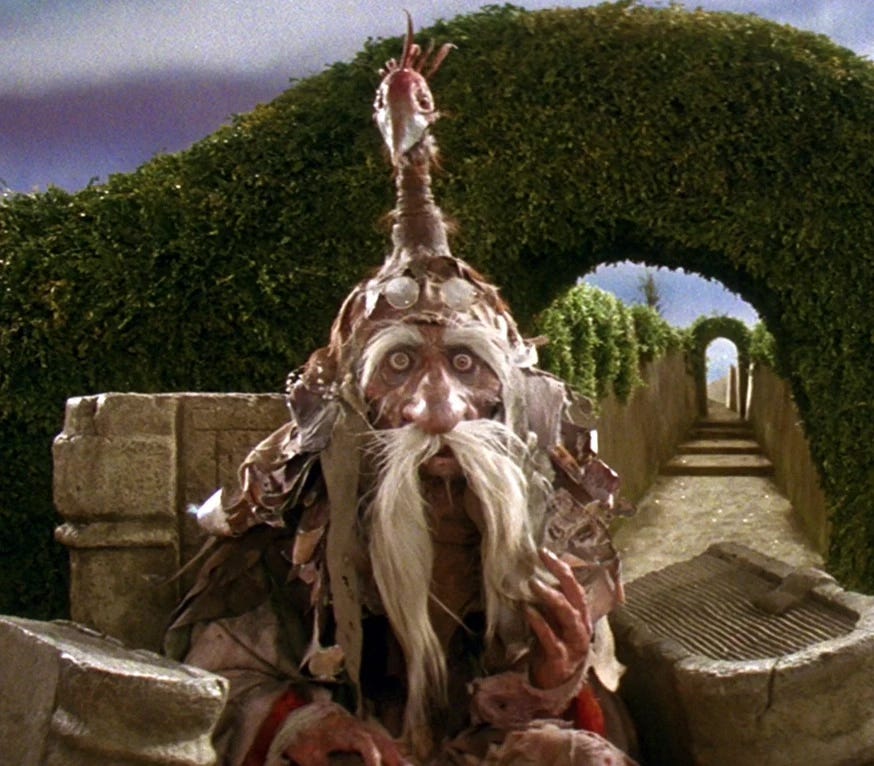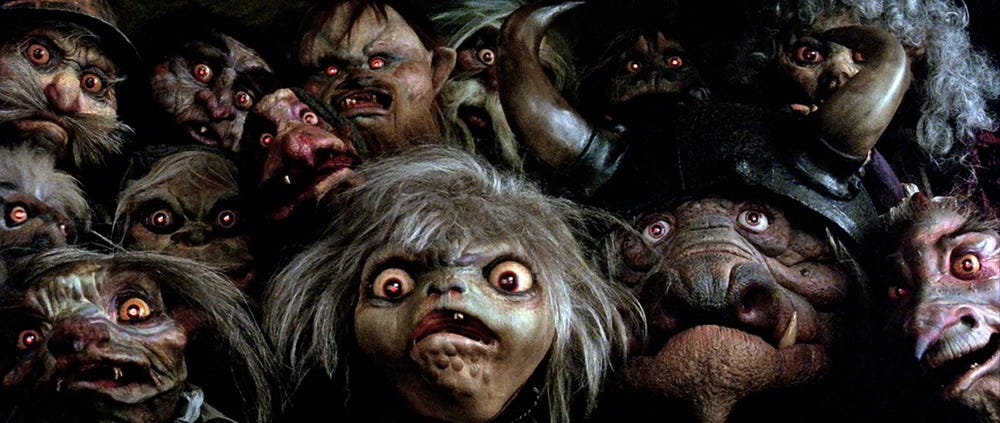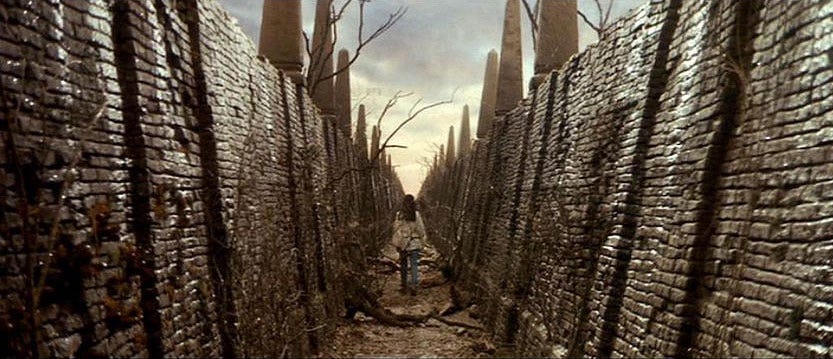A No-Mucking-About Beginner's Guide to Starting Out as a Writer
Mapping the labyrinth

I’m often questioned by younger writers looking to begin their journey. The field of writing - especially commercial writing - is as glamorous as it is treacherous. There’s a wealth of information out there, but you need to separate the truth from the clickbait. In an attempt to be more prepared next time someone asks me, and to save me from forgetting anything useful and just burbling about the price of printer ink these days, I’ve gone through some of my previous essays - namely, My Future Shock Hell, Submit or Surrender: Why Can’t I Take My Own Writing Advice? and Why Writers Are Full of S*** (And Why We Have To Be) - expanded upon several key points and arranged them into the following no-nonsense bullet-list.
This is aimed largely at younger writers (the Great Unbroken), but also rookies of any age looking to enter the field for the first time, either commercially or in sacred pursuit of the art itself.
Bear in mind that the following points are not universal truths. I make no claim whatsoever to be offering a comprehensive guide to success - I’ll leave that to the clickbait-gurus and bullshit-merchants.
These points are based on the singular experiences of me: a wistful, white, lower-middle class yobbo from a working-class background, who’s completely self-taught, and spent over twenty years bumbling his way in and out of freelance writing on comics, fiction and audio in the worlds of horror, fantasy and science-fiction.

I can’t draw you a map of the Labyrinth. No one can. Its walls and corridors shift over time, they adapt to suit or hinder the individual traveller. All I can do is draw a squiggle that represents the route I’ve taken so far. There are countless other paths, other experiences, other traps. So read widely and with an open heart. Gather clues from writers whose routes contrast with mine and use them to build a composite map of your own.
When Starting a Life in Writing…
There is no one-size-fits-all advice. Everyone’s circumstances are different. Not all writers start in the same place. We arrive with different experiences and varying capacities for learning.
Writers further down the road than you can only really tell you what worked for them. Listen, but pick and choose what works or you.
Different backgrounds bring different obstacles. You’ll face different expectations and prejudices based on what and who people think you are. And how much you might be of value to them. Listen to those writers who have paved the way for people like you.
Who Are You?
Assess yourself. What’s your home situation? Your health situation? Your work situation? How much cash you got in the bank?
How much writing time do you think you have? It’s a lot less than you think.
How ambitious are you? Finishing a poem no one ever reads, but which holds everything you have in your heart is a goal as worthy as writing a global bestseller. All objectives are relative.
Are you good at studying and teaching yourself? There’s a wealth of excellent books and resources out there. Or are you someone who needs structure, feedback, and other people? Then a creative writing course may be for you. In either case, what resources can you afford and are easily available?
Challenges such as dyslexia or dysgraphia need not be a barrier to writing. It didn’t stop F. Scott Fitzgerald, Agatha Christie or Quentin Tarantino. Seek help and support wherever you can. You’re not alone.
Think like the writer you want to become.
Why?
“Because getting published will validate who I am!” “Because I want people to love me!” “Because I wanna get rich!” Such answers are tragically incorrect. As Steven Pressfield warns in The War Of Art, avoid staking your self-worth, your identity, your reason-for-being, on the response of others to your work.
Do you wanna go freelance and get paid to be a storyteller? Okay. Then you may be looking at screen or audio-writing. Or else licensed work in video games, fiction or comics. Such ‘tie-in’ work involves writing stories for established, branded characters like Spider-Man or Luke Skywalker. Such characters are lovingly referred to as ‘IP’ or intellectual property. You do not own these characters and whatever stories you may write for them will never belong to you. If the company one day makes a billion-dollar movie involving a version of your character or threads plucked from your story, the best you can expect is a namecheck at the very end of the credits.
Tie-in work does not pay enough to live on, at least not at first. You’ll need to write lots of these stories and build up a portfolio of familiar brands on which you’ve worked. This will score you more work. You also need to work fast to be in any way profitable. Pay ÷ the hours it took you to write the thing = whether said thing was worth doing in the first place.
Do you want to write novels? Then maybe start with short stories. This will teach you the discipline and craft required to get you through the marathon of writing a novel. It’s easier to write a succession of shorts, each better than the last, than get mired in a single 100,000-word prose-swamp.
Unless you’re a game-show host or in the SAS, your novel will very likely be a back-end deal. You’ll write the entire thing in your own time, draft after draft, over several months, perhaps years, before submitting the finished project to an agent or publisher, who might - fingers crossed - ask you to rewrite most of it, then - maybe - direct you towards some money. Thus only a writer with the IQ of a stick of celery writes to get rich. Your novel must be a story you need to write, that you can’t not write. Novel-writing runs on passion. Without it you likely won’t reach the finish line.
Do you want to write a bestseller? Oh, boy. That one never gets old. There’s no way of predicting what a bestseller may be, and trying will only get in the way of your writing. Instead, concentrate on doing the best work possible. Write your novel because you’ll explode if you don’t, not because you think it’s something the market wants.
Securing a good agent will help you negotiate the best possible publishing deal. Agents typically charge 15% commission from your earnings, which is a good trade-off in the long-term. Once they’ve suggested tweaks to the book and got it ‘ready for market’ they’ll send it out to publishers on your behalf. They’ll likely have relationships with those publishers and will know the ones most likely to respond to your book. A good agent isn’t interested in a single book, but rather will seek to work with you over the course of a long and successful career. Their commission means they’re motivated to help you succeed.
However, securing an agent is as torturous a process as submitting to a publisher without one. Grab a copy of this year’s Writers’ & Artists’ Yearbook to find out more about that particular region of the Labyrinth.

It’s impossible to make a living from creative writing when you’re starting out. Unless you’ve managed to secure a grant or your parents own a yacht. Otherwise, you’ll need to secure a stable income while writing in your spare time. Most writers rely on day jobs, supportive partners or affluent families (all of which rarely get a mention in interviews), or else a few thousand loyal online followers who’ll back their every Kickstarter. Otherwise, writers work freelance with a diversified skillset that allows them to make some kind of a living by juggling drab but better-paying gigs – like proofreading, subediting, copywriting – alongside their passion projects.
Are you writing purely for self-expression with little interest in the follies of publishing, driven by the desire to simply perfect your craft? Then you are one of God’s own, a Zen pilgrim, a sacred fool, the best and purest of us all!
How Are You Planning to Reach Your Readers?
The likeliest route to being traditionally published is through an agent. The best route to freelance work is to reach out to editors with a polite query and a portfolio that zings. Both agents and editors have a lot of people trying to reach them, so expect to be firewalled.
Funding platforms like Patreon and Kickstarter have changed the writing game dramatically, allowing writers to secure the funding required to pay the rent while completing projects-in-progress (as did Becky Chambers with her 2014 debut The Long Way to a Small, Angry Planet), or else bypassing the publisher entirely via self-publishing and serving the reader directly. But you’ll need to build a Brandon Sanderson-sized audience first, and that means playing the social media Hunger Games. May the algorithm be ever in your favour.
Storytelling is for everyone, but not every story is written for everyone. The Jack Reacher books are not written for the same audience as Wolf Hall. Read the room. Know your audience.
Beware Assumptions!
Beware modelling a freelance career on what other writers call themselves in interviews and other such promotions. If a writer refers to themselves as a ‘graphic novelist’, you may be forgiven for believing they spend 100% of their time writing graphic novels. It’s very possible they do not. Titles such as ‘graphic novelist’ or ‘screenwriter’ are often self-applied by writers looking to score more work in a specific field or else position their brand more strongly within it. It’s a perfectly viable tactic, but it’s meant to persuede editors and readers, not younger writers entering the field.
Don’t assume those people make a living purely from that one revenue stream. Sure, if you’re trying to market yourself, then branding along those exclusive lines can help focus your identity for that audience. But what you really are - certainly at that point in time - is a ‘freelance writer’. That’s the true identity under which you’ll be juggling several projects, some creative, some pure drudgery, some you’ll want to shout about, some you’ll keep under wraps. Behind the scenes, you need several irons in the fire. Delivering takeout or doing corporate copywriting gigs are what will sustain you while you’re writing your next script or waiting for your next royalty check.
Don’t Let Passion Become Poison!
This holds especially true for glamour industries such as screenwriting, video games and comic books. The kind of gig that makes you sound cool when you’re at parties and people ask what you do. There are too many companies and too many players in the creative industries who will prey upon your passion. Look no further than the #MeToo movement to see what female creatives have long been expected to sacrifice to get a shot at their dream job. There are IP-holders out there who will exploit your love for their worlds and characters by trying to coax unpaid work out of you. Such bad actors may expect you to endure extortionate conditions, knowing that you’ll endure anything for a go at writing your favourite movie character or working on that video-game franchise you’ve loved since you were a kid.
And they’ll tell you if you won’t do what they’re asking, there’s an endless supply of people who will. And, sadly, they are correct.
Know where the line is drawn.
The glamour jobs - and I’m afraid I’m talking about comics in particular - attract a lot of prospective writers, which means they’re almost always firewalled in some way and rarely operate a formal window of entry, a permanent submissions procedure through which professional writers can introduce themselves and offer their services. You may do okay once you’re well-known and have loads of successful mates who can put a word in for you. Otherwise, the struggling freelancer must resort to off-road tactics, sliding into DMs, schmoozing at conventions and generally ‘networking’, which is really just a nice way to describe snaking your way through the court to reach the ear of the King.
Such casual, feudal arrangements are the perfect breeding ground for the mildew of narcissism, gatekeeping and predatory behaviour. Have such industries more work to do in this regard, to formalise the intake of talent and safeguard them from bad actors? I’d say, yes. As we all know, predatory conduct and inappropriate behaviour have no place in any profession, yet newcomers must be aware that it continues to exist and must be called out wherever possible.
Know that whatever your level of experience or perceived status, you deserve to be treated with respect and professionalism. At. All. Times!
If Agent of Weird got you smiling, thinking, or ready to create, then please consider sharing, subscribing or throwing me a healing potion. Every drop of reader-support will help this project grow.
Read, Write, Study
Craft is everything. It is the alpha and omega of writing. It will get you your first gig, your first readers. It will carry you to the end. There is nothing else. Not accolades, not fame, not money, not followers. All such are fleeting vanities. Craft will tell what’s wrong with a work in progress and how to fix it. Craft will help you argue back when given notes. Craft will help you express your idea as clearly as if the reader thought of it for themselves. Cleave to your craft the way the samurai cleaves to the discipline of steel.
The classic advice about learning to write is to read a lot and write a lot. But these two are of limited benefit without consistent study. If you want to become a great writer of fiction, you’ll dutifully read Austen, Woolf, Hemingway, et al. But unless you know why you’re reading them, all you’re really doing is ticking titles off a list.
What’s so special about Pride and Prejudice and Watchmen? Research and understand the innovations those books contributed to their medium. Then make up your own mind. Have the courage to disagree and the theory to back it up. With a clear head, unclouded by hype or reverence, ask simple questions. What techniques is this story using? What effect does this create? What are the story’s antecedents? What’s the historical context, the circumstances in which this story was produced? What do you know about the mindset of the person who wrote it? Take nothing for granted. Develop an aggressive, even arrogant sense of what you think works or doesn’t work. Cultivate a sense of taste. Compile your own canon.
You can write a dozen short stories, but if you’re not learning more about what fiction can do, experimenting with new techniques, and being brave enough to fail, then you will never improve and every story you write will suck just as much as the last one.

The Three Pillars
A temple of writing is built upon three pillars.
UNDERSTANDING LANGUAGE
UNDERSTANDING THE MEDIUM
UNDERSTANDING DRAMA.
If you don’t know how sentences work, or the difference between an adverb and a noun, then you’re the equivalent of an electrician who doesn’t know how to wire up a plug. The boring nuts-and-bolts stuff like prepositions and conjunctions are the bedrock of craft. Grab a book on grammar and style, break out the index cards and learn like you’re studying for a medical exam. You done? Great. Now you can proofread. Now you can copy-edit. Now you’ve diversified your writing skillset, which can land you other freelance gigs while working your own projects.
Learn your medium, whether that’s fiction or cinema or poetry or comics. Learn its history, its techniques, its limitations, its politics, its potential.
Learning drama is about understanding how to build character, a scene, an entire narrative. Whatever your chosen medium, screenwriting books are a good bet when it comes to learning drama, as they focus so directly on character and structure.
Writing is magic. It’s spiritual, cathartic, ineffable, but it’s underpinned by the brute carpentry of grammar, by the subtle geometry of storytelling, by the physics of character interaction.
Everyone is learning, always, even the greats, and no one ever finds a way out of the Labyrinth.
The Only Formula You’ll Ever Need
Here’s drama in a nutshell: Your focal character wants something, but something or someone stands in their way, and something awful will happen unless that character achieves their goal. This paradigm goes back to the days of togas and inventing democracy.
Line of action. Counter-action. Stakes. The only story formula you’ll ever need.
The key to understanding how this applies to storytelling is to see how it exists on both a macro level and a micro level, that is, how it relates to the narrative as a whole and how it works within the smallest component of that narrative, the scene. John Yorke’s Within the Woods (see below) explains this concept very well indeed.
What you’re developing here is the writer’s x-ray vision, the ability to grasp the underlying structure that’s driving a story or a single scene within it.
The overall process of learning is alchemical. You’re turning base knowledge into precious instinct. You’ll start out learning the classic theories, techniques and paradigms, employing them self-consciously over and over. And your writing will be clumsy and anxious for a while, but keep going. Eventually your cerebral muscle-memory will kick in and you’ll start writing without thinking about the best way to do it. It’s that Use-the-Force, Behold-the-Matrix moment when you finally get out of your own way and begin to trust yourself.
Here’s where you’ll start hearing your own voice and less that of your influences.
Breaking In
A myth.
‘Breaking in’ implies there’s this one barrier, this one door that you have to get through, on the other side of which is this wonderful literary Wonka-land. Here the clouds of rejection do not linger, readers frolic in your wake, projects grow on trees, and editors tug at your coat-tails like Oompa-Loompas, begging you to write whatever you want.
The truth is this: you’ll exhaust yourself breaking down that initial door, getting past that first obstacle and getting your debut published. And once you’re through that door you’ll find… Another door. And behind that? Another door. And so on and so on. These doors will grow more varied, leading to different, ever-more dizzying possibilities, but remain as hard to get through as the first.
Professional writing is a forever war. Obstacles regenerate like Wolverine. They persist and proliferate and mutate, finding new and horrible ways to obscure your target and stab holes in your hard-won confidence.
When you’re submitting anything to anyone for the first time you’re submitting ‘cold’. You’re submitting ‘on spec’, which means the editor, agent or producer is under no obligation whatsoever to have the least interest in the project you’ve spent the last year sweating over. Whether you’re submitting a short story to a magazine, sending a screenplay or novel to a prospective agent, or pitching an audio drama to a producer, the ordeal is the same. The hard work gets done and it gets done for free. You toil not only with no promise of success, but also with the seeming certainty of failure.
So you conduct your due diligence, read the submission guidelines, do your market research, comb your work for typos, read the submission guidelines again, get the project in the best, most appealing shape it can reasonably be. Then lob it through the submission window you stand the best chance of breaking. Now you forget about it and start writing something else.
This Zen state of acting without expecting reward is crucial for your long-term mental survival. It’s also your best chance of success, of producing your best work.
Steady As She Goes
Keep a logbook as you write. Record your daily work hours. Months of doing this will generate valuable data on how long it takes you to write a project. Make notes on mistakes made and lessons learned, giving future-you a heads up when facing familiar obstacles.
Create a website or some professional online platform, somewhere people can reach you, see examples of your work, and where you can present your best, most interesting self. You can be the next Reina Telgemeier or Zadie Smith; it means nothing if no one knows you exist. An obscenity-filled social media feed is not the best presentation of you. Don’t be an outrage-merchant or a drama-farmer. Such things will not get you where you hope to be.
Be kind, thoughtful, and do good where you can. Stay classy.
Exercise, meditate, be among friends.
If you can afford it, join the Society of Authors.
There Is No Secret Ingredient!
As Po, the Kung Fu Panda, would say.
The reason we cherish craft above all is because craft enables your individual voice, that sum-total expression of who you are, what you’ve been through, and how you - and no one else - sees the world.
A writer’s unique voice is what makes their stories sing. It’s the thing that grabs agents and publishers, strikes a chord in readers’ souls. It’s what makes you stand out and how you transcend the stock tropes of any genre.
As writer/comedian
puts it in this revelatory piece, “You are the genre.”
“Each individual is the most important factor of their endeavours — not the endeavour itself.”
Tim Barnes, a wise dude
Ask yourself who you are, what you want to achieve with your writing. Ask why? Take the time to strategise your best chance of success, like you’re royalty in Game of Thrones moving chess pieces around a great big Warhammer map. See through mist and mirage. Don’t fall so in love with the idea of writing that you can’t see when others are taking advantage. Read, write, study. Cultivate discipline.
Write like you’ve already been rejected. If you’re too busy worrying about rejection, then you’re not writing with a clear head. Writers of drama think about stakes all the time. Giving the protagonist something to win or lose energises a scene. It makes the reader care. But thinking about what’s at stake for you? It’s like trying to sprint with a bag full of shopping in each hand and a sumo wrestler stuffed in your rucksack.
Craving reward – love, money, followers, fans - or else guarding against potential disaster - misreadings, cancellation, outrage, apathy - these will only blunt your craft and stop you from getting the job done. Focus not on the target, but on the immediacy of the craft.
Accept that you’ll never be perfect. Realise that no writer is perfect, however much their marketing may strive to the contrary.
Letting go of your craving for perfection is perfection in itself.
You’re in the Labyrinth, but you’re not lost.
You’re exploring.
A List of Books
Not exhaustive, just the ones that worked for me.
Grammar and Syntax
Sin and Syntax: How to Craft Wicked Good Prose by Constance Hale
Fiction
Steering the Craft: A 21st Century Guide to Sailing the Sea of Story by Ursula K. Le Guin
The Emotional Craft of Fiction: How to Write the Story Beneath the Surface by Donald Maass
How to Read a Novel: A User’s Guide by John Sutherland
How Not to Write a Novel by Sandra Newman and Howard Mittelmark
The Western Lit Survival Kit: How to Read the Classics Without Fear by Sandra Newman
On Writing: A Memoir of the Craft by Stephen King
50 Literature Ideas You Really Need to Know by John Sutherland
Comics
Understanding Comics: The Invisible Art by Scott McCloud
Making Comics: Storytelling Secrets of Comics, Manga and Graphic Novels by Scott McCloud
Graphic Storytelling and Visual Narrative by Will Eisner
Comics and Sequential Art by Will Eisner
Drama & Structure
Into the Woods: How Stories Work and Why We Tell Them by John Yorke
The Writer’s Journey: Mythic Structure for Storytellers and Screenwriters by Christopher Vogler
Save the Cat: The Last Book on Screenwriting That You’ll Ever Need by Blake Snyder
Surviving
The War of Art: Break Through the Blocks and Win Your Inner Creative Battles by Stephen Pressfield.
Author / Writer Substacks
Again, not exhaustive, just ones that work for me, given their emphasis on technique and truth.
A summary of Mapping of the Labyrinth is available right here as a free downloadable PDF…
Stay weird.
If this post got you smiling, thinking or ready to create, then please…
Or…
Every drop of reader support helps this project grow!








WOW - absolutely excellent article, Alec! For all seasoned and aspiring writers, this is essential reading for us all :)
Great article with lots of sage advice. And for those looking to sell said short stories… I have a pretty dang good blog.